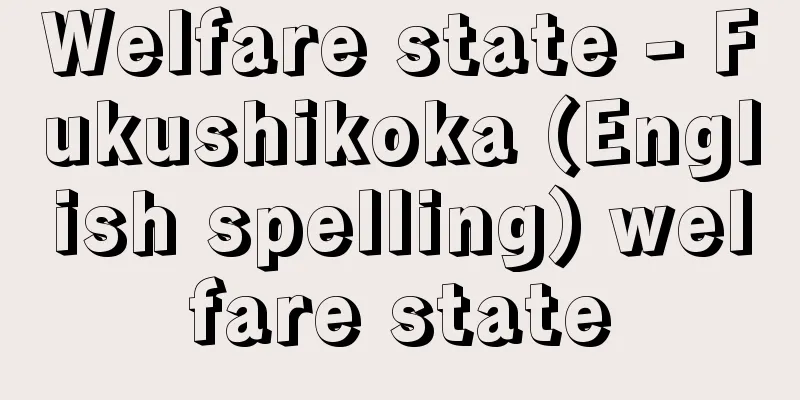Welfare state - Fukushikoka (English spelling) welfare state

|
Generally speaking, it refers to a modern state that has set the promotion of the welfare of its citizens as its national goal and has actually achieved a considerable degree of welfare. Unlike the 19th century free state or night watchman state, it is a state that does not merely passively maintain order, but actively works to stabilize and secure the lives of its citizens, and in this sense is synonymous with a proactive state or social state (Sozialstaat, German). The enlightened despotic monarchy of early modern Germany (Prussia) was also called a welfare state (Wohlfahrtsstaat, German), but it was a police state (Polizeistaat, German) in which the state interfered in every aspect of people's lives in the name of public welfare and promoting the happiness of the people. The term welfare state as it is commonly used today was first used in the UK in the late 1930s to mean a state that aimed to maintain and improve the welfare of its citizens, in contrast to the Nazi power state or warfare state. After World War II, the UK, Sweden, and many other Western European countries actively implemented policies aimed at realizing a welfare state, and the term became widespread worldwide. The goals of a welfare state include the elimination of poverty, stabilization of living standards, equalization of wealth and income, and maximization of the general welfare of the people, but the specific content varies depending on the historical and socio-economic conditions of each country. For example, according to the Beveridge Report, "Social Insurance and Related Services" (1942), which had a major influence on the formation of the welfare state in the UK, the goal of social security is to guarantee a national minimum to all citizens regardless of their individual financial resources, thereby realizing "freedom from want." The system to achieve this is centered on social insurance, which provides minimum living benefits when earnings are interrupted or lost, and as a prerequisite for this to function effectively, the achievement of full employment, family allowances, and the creation of a national health service are necessary. The first common feature of welfare states is that they have established a social security system to guarantee the right to life of their citizens. Secondly, economically, welfare states are states based on modified capitalism that seek to correct the defects of capitalism, such as the gap between rich and poor, unemployment, and other instabilities, and are states in which the state has widespread control over the economy. Thirdly, politically, they are based on civil liberties and democracy, but in reality they contain problems such as the expansion of administrative power and bureaucratization, and the welfare state theory has been criticized as an ideology that conceals reality. [Ryōshi Mitsuhashi] "Welfare State," six volumes, edited by the Institute of Social Science, University of Tokyo (1984-85, University of Tokyo Press) " ▽ "Towards a Welfare State," by Maurice Bruce, translated by Akita Joji (1984, Hosei University Press) " ▽ "Welfare State and Welfare Society," by W.A. Robson, translated by Tsuji Kiyoaki and Hoshino Shinya (1980, University of Tokyo Press)" [Reference] |Source: Shogakukan Encyclopedia Nipponica About Encyclopedia Nipponica Information | Legend |
|
一般には、国民の福祉増進を国家の目標とし、現実に相当程度に福祉を実現している現代国家をいう。19世紀的自由国家、夜警国家とは異なり、単に消極的な秩序維持にとどまらず、積極的に国民生活の安定・確保を任務とする国家であり、この意味では積極国家、社会国家Sozialstaat(ドイツ語)と同義である。なお、近世ドイツ=プロイセンの啓蒙(けいもう)専制王政も福祉国家Wohlfahrtsstaat(ドイツ語)とよばれていたが、それは、公共の福祉、人民の幸福増進の名のもとに、国家が人民の生活のすみずみまで干渉する警察国家Polizeistaat(ドイツ語)であった。今日、一般的に使われている意味での福祉国家は、1930年代末のイギリスで、ナチスの権力国家ないし戦争国家warfare stateとの対比において、国民の福祉の維持・向上を目ざす国家を意味するものとして用いられたことに始まり、第二次世界大戦後イギリス、スウェーデンなど多くの西欧諸国において、福祉国家の実現を目標とする諸政策が積極的に展開されたことにより、世界的に普及した。 福祉国家の目標としては、貧困の解消、生活水準の安定、富・所得の平等化、国民一般の福祉の極大化などが掲げられるが、その具体的内容はそれぞれの国の歴史的・社会経済的諸条件により異なる。たとえば、イギリスでの福祉国家の形成に大きな影響を及ぼしたビバリッジ報告『社会保険および関連サービス』(1942)によれば、個々人の資力にかかわりなく全国民にナショナル・ミニマムを保障し、それによって「窮乏からの解放」を実現することが社会保障の目標であり、そのための制度としては、稼得の中断・喪失時に最低生活給付を行う社会保険を主体とし、これを有効に機能させるための前提条件としての完全雇用の達成、家族手当および国民保健サービスの創設などが必要となる。 福祉国家の共通的特色の第一は、国民の生存権を保障するものとして、社会保障制度が確立していること。第二に、福祉国家は、経済的には資本主義の欠陥である貧富の格差や失業その他の不安定性を修正しようとする修正資本主義のもとでの国家であり、経済に対する国家のコントロールが広範に及んでいる国家である。第三に、政治的には、市民的自由と民主主義を基礎にしていることなどであるが、実際には行政権力の肥大化、官僚化などの問題を内包し、福祉国家論は現実を隠蔽(いんぺい)するイデオロギーであるとの批判もある。 [三橋良士明] 『東京大学社会科学研究所編『福祉国家』全六巻(1984~85・東京大学出版会)』▽『モーリス・ブルース著、秋田成就訳『福祉国家への歩み』(1984・法政大学出版局)』▽『W・A・ロブソン著、辻清明・星野信也訳『福祉国家と福祉社会』(1980・東京大学出版会)』 [参照項目] |出典 小学館 日本大百科全書(ニッポニカ)日本大百科全書(ニッポニカ)について 情報 | 凡例 |
<<: Welfare office - fukushijimusho
Recommend
Original calorie self-sufficiency rate - Orijinaru Kaorijikyuuritsu
...In other words, livestock products can also be...
Vilyuisk (English spelling)
A city in the Sakha Republic in eastern Russia. It...
sparkler
...Sonic exploration is often used to investigate...
bradykinin
...Extreme heat (over 45°C), cold (under 15°C), e...
Justina
? ‐388 Wife of the Roman Emperor Valentinian I. Ma...
Nuphar pumilum (English spelling) Nuphar pumilum
…[Motomi Ito]. … *Some of the terminology that me...
Nguyen Anh - Nguyen Anh
...Nguyen Phuc Anh, a member of the southern Nguy...
Opossum - Opossum (English spelling)
A general term for animals belonging to the famil...
experiment
...Therefore, in order to verify a hypothesis tha...
Michitaka Kujo
Year of death: January 4, 1906 (Meiji 39) Year of ...
Takagi [village] - Takagi
A village in Shimoina County, southern Nagano Pref...
emery
…Specific gravity: 4.0-4.1. A complex mixture of ...
Ahmad Bukar - Ahmad Bukar
…His territory spread especially eastward, reachi...
Eickstedt, Egon, Freiherr von
Born: April 10, 1892, Jerzytsby, Posen Died Decemb...
Battle of Fujishima
In 1338 (Engen 3 | Ryakuo 1), a battle took place ...









